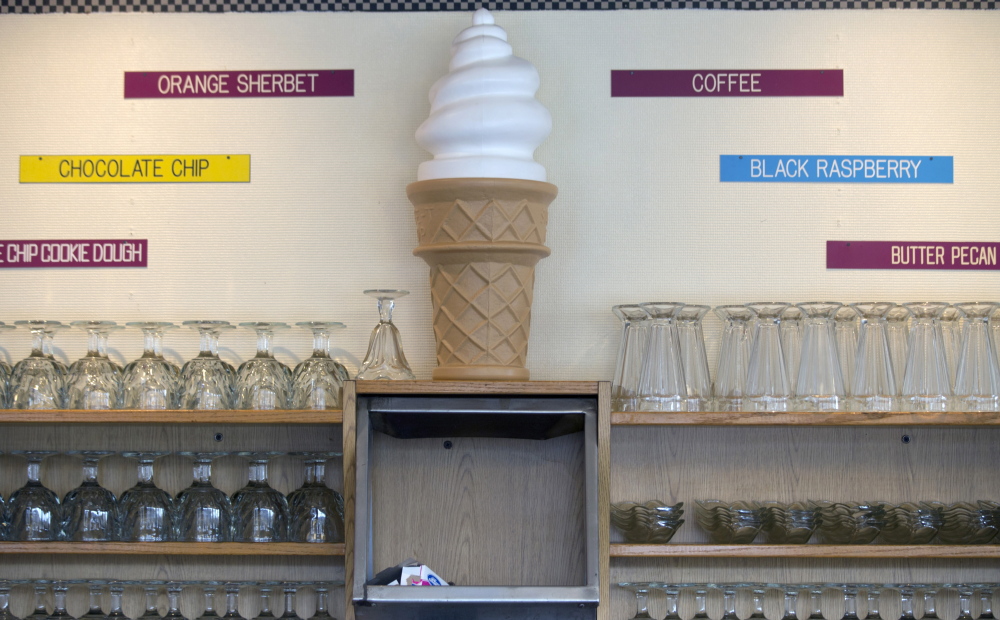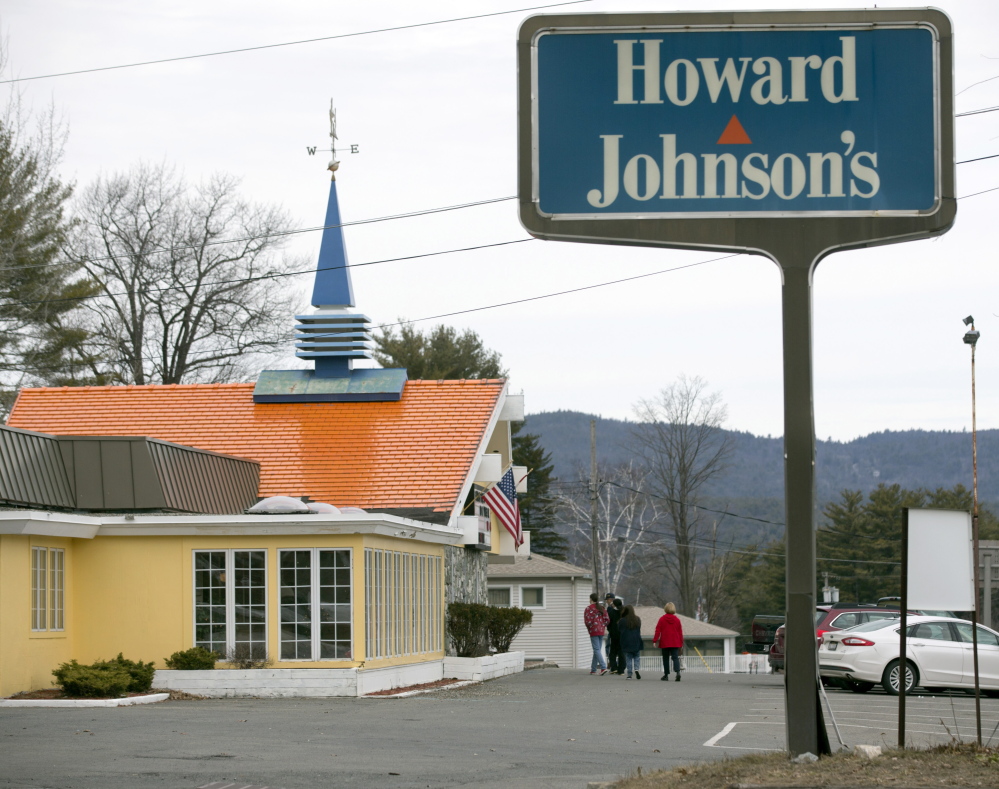LAKE GEORGE, N.Y. — The 28 ice cream flavors are just a cool memory. Those fried clam plates? All but eighty-sixed. Howard Johnson’s restaurants – the once-ubiquitous orange-roofed eateries that nourished baby boomers before the rise of burgers and burritos –have almost disappeared.
The HoJo’s on the main strip of this Adirondack Mountain resort town and another in Bangor, Maine, are the last two restaurants operating under the famous name. The Bangor restaurant is living on borrowed time. A third – also in the Adirondacks, in Lake Placid, New York – turned off its fryers a month ago after almost 60 years.
“We have one of the last orange roofs left,” said John LaRock, frying up breakfasts at the Lake George HoJo’s, which retains a time-capsule quality, from the pie man on the weather vane to menu items that include Hawaiian-baked ham.
“We have a lot of people ask for the root beer floats. … People love the fried haddock and clams, like it used to be.”
Like pay phones and parking lot photo kiosks, Howard Johnson’s restaurants are almost meaningless to millennials but strike a nostalgic chord with those in middle age. In the postwar years, the orange roof with a blue spire was an easy-to-spot sign of a dependable place to park the station wagon, grab a meal and maybe spend the night. Modern pop culture gave HoJo’s and its orange sherbet a memorable nod in a pivotal 2012 episode of the ’60s period drama “Mad Men.”
Howard D. Johnson parlayed a soda fountain opened south of Boston in 1925 into a roadside empire. By the time the first hotel came in 1954, restaurants with the franchise pioneer’s name were ubiquitous.
“It was all very space-age modern,” said Richard Kummerlowe, who maintains the HoJo’s homage website “America’s Landmark: Under the Orange Roof.”
There were around 1,000 HoJo’s by the end of the ’70s.
Stiff competition from McDonald’s and other fast-food outlets eventually took a toll on the slow-to-change food chain. Even the boast of 28 flavors seemed quaint in the days of Haagen-Dazs and Ben & Jerry’s.
The Wyndham Hotel Group has rights to the name that still graces more than 400 Howard Johnson hotels (without the “s”) worldwide. In contrast, the number of restaurants has been steadily dwindling for decades. Wyndham allows remaining restaurants to use the brand name based on grandfathered contracts.
That means LaRock’s restaurant is like a HoJo’s hologram. It has the famous name and the orange roof, but no traditional franchise relationship. The menu evokes HoJo’s heritage, but it’s his creation. The ice cream is from a company in Maine. LaRock serves 12 flavors.
Customers come to HoJo’s for old-school dishes such as meatloaf and fried fish, but there’s also the tug of nostalgia.
“Back in the ’50s, we used to go to New Jersey all the time from Long Island, and there used to be all Howard Johnson’s along the rest areas,” said Jo Ann Frevele, eating a breakfast of eggs with her husband (she had them scrambled, he had over easy).
The Lake George restaurant had been closed for several years when it was reopened under lease in January by LaRock, who washed dishes and cooked here in the ’70s. He keeps it open for limited hours in the off season but plans to expand hours for this resort town’s busy summer.
Drinking coffee at the Bangor restaurant, James Farley can still recall coming for the grand opening in 1966.
“We ordered clams. Well, when the plate of clams came, you wondered how in the hell you were going to eat it all,” he said. “And the line behind us went out to the road.”
No lines here now. The Bangor restaurant is on limited hours, and co-owner David Patel said the restaurant will close soon unless someone wants to lease it. The idea would be to transition to a continental breakfast for hotel guests, he said.
Kathe Jewett, who has worked as a waitress at the Bangor restaurant since it opened, fears the restaurant is living on borrowed time. The clientele is aging, just like the restaurant itself.
Still, she knows the customers on a first-name basis because they’re her friends. Her daughter, Julie, has worked there for three decades and is now manager.
“I’ve stayed because I feel so attached to it,” said Jewett, 67, “It’s been a way of life.”
Send questions/comments to the editors.




Success. Please wait for the page to reload. If the page does not reload within 5 seconds, please refresh the page.
Enter your email and password to access comments.
Hi, to comment on stories you must . This profile is in addition to your subscription and website login.
Already have a commenting profile? .
Invalid username/password.
Please check your email to confirm and complete your registration.
Only subscribers are eligible to post comments. Please subscribe or login first for digital access. Here’s why.
Use the form below to reset your password. When you've submitted your account email, we will send an email with a reset code.